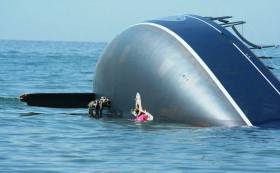Displaying items by tag: Keel Failure
“We write to remind you that, due to the age of your vessel, Underwriters require an update of the last survey and valuation report, to be carried out ashore by a qualified marine surveyor who carries professional indemnity cover, prior to your policy’s next renewal date.”
The insurers of my yacht Scribbler issued their demand and so, my lovely boat in which I have had so much enjoyment and trusted her so much and she has responded so well to looking after me and all aboard, has been subjected to the poking and prodding of the surveyor and a detailed 22-page report has issued which concludes that: “the vessel has been constructed to a high standard and the boat’s present condition is considered very good for the boat’s age.”
That is 33 years this year and the conclusion, which pleases me, is a tribute to the Sigma 33 builders, Marine Projects of Plymouth and the care and attention that has been lavished on her.
At present, she is getting TLC following her health check-up and one of those checks included an examination of the keel bolts.
That got me to thinking about whether enough attention is given to this important part of the boat and how, when we have been well heeled-over during strong wind conditions when racing, so much about the safety of the boat and all aboard is dependent upon the “righting moment” and the keel.
How much attention do owners give to that vitally important part of the boat and its structure?
There have been many changes over the years from traditional long-keeled boats, integral keels to bolted-on keels and so on and, in the modern conception of offshore yachts, swinging keels.
Doing a bit of research about keels I learned that World Sailing is launching an In-Build Validation Scheme to look at the fabrication of the keel and attachment in yachts and, though this is primarily being developed to address what is described as “the increasing loss of keels on offshore sailboats,” it is an interesting thought, is it not, to consider one’s keel.
World Sailing is to produce its Validation Scheme this August and it will then be discussed at the organisation’s annual conference.
What will it all mean for those of us whose primary engagement is club sailing or coastal cruising and even more for those who cruise abroad and for the offshore racers?
That remains to be seen, but for my beloved Scribbler, who’ve looked after her for so many years, we’ve checked all keelboats and, as she ages to maturity over the years ahead, we’ll be implementing a keel bolt replacement programme as decided necessary while she remains giving us sailing enjoyment.
Very important to mind the bit of the boat that keeps you upright!
• Listen to the Podcast below
What Solution to Vendee Globe Keel Failure Woes?
#VG2012 - As another yacht retires from the Vendee Globe from a keel failure - as happened earlier this week to Jean-Pierre Dick's Vorbac-Paprec 3 - Elaine Bunting asks on her Yachting World blog what can be done to work out the flaws.
It's an "immensely complicated" subject, as she points out, "but the simple place to start is that no one - no designer, no engineer and certainly no sailor - wishes to take big risks in this area".
VG yachts have used a variety of materials for their keels, each with their drawbacks in different conditions, so it's impossible to pin the blame on one style over another.
There are also numerous areas where things can go wrong, from design and manufacturing to attachment and other structural problems.
One possible solution suggested by Bunting is to declare a one-design keel which puts none at a disadvantage and would ensure a studier 'failsafe' option - but whether the competing skippers are ready to make the leap is still up in the air.
Yachting World has much more on the story HERE.





























































